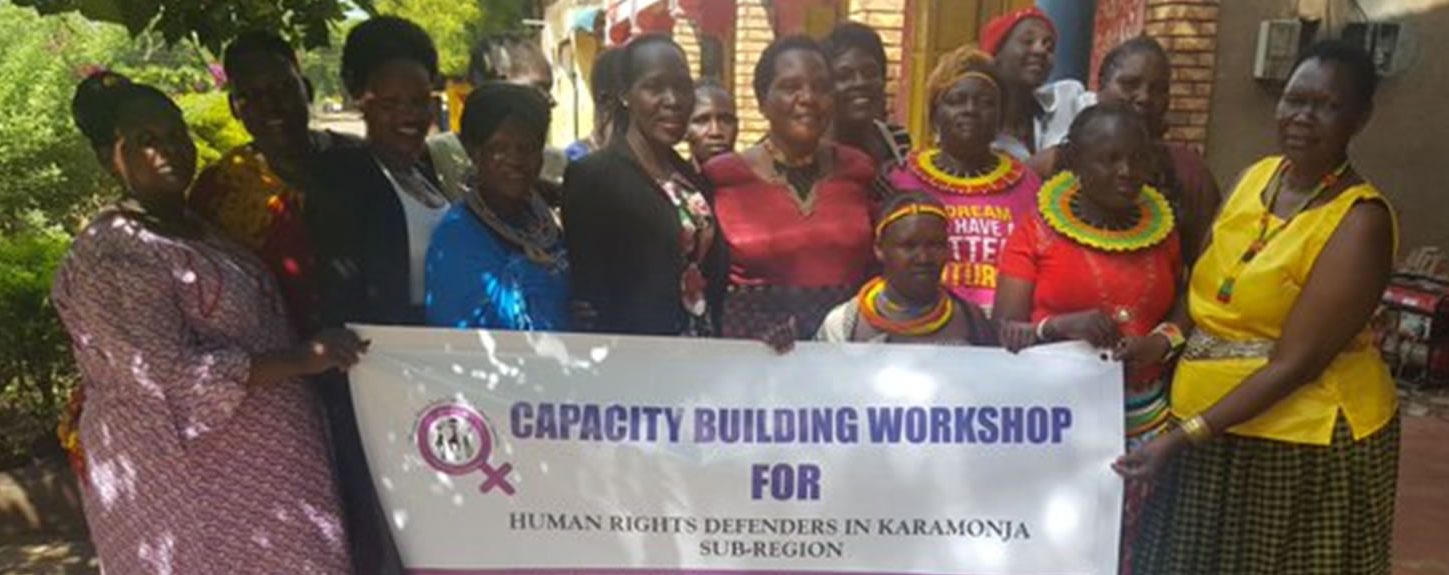Caption: WHRDs from Karamoja pose for a photo after the workshop.
WHRDS from Karamoja region are involved in fighting against GBV, FGM, Widow Inheritance and defending Land and environmental rights, Child rights, women’s rights among others. These are rights that were formally not observed or respected due to cultural and social norms in Karamoja region. For instance, women were inherited as property upon the demise of the husband. A girl had to go through FGM to be considered a “real woman”. Women did not own land and physical battering was looked at as disciplining a woman or a child.
This has made the work of women defenders increasingly difficult as they maneuver cultural norms to fight against violence inflicted on them. It is a difficult battle that can only be won by speaking out to challenge the existing cultural and social norms. Below are some of the challenges they faced in the course of their work.
A child’s rights woman defender from Amudat district followed up on a case where a young girl had been raped and reported it to the police. To her surprise, the police abused her for making sure of an arrest and the parents of the girl only asked for compensation while resisting the arrest of the perpetrator.
A female journalist and woman defender against Female Genital Mutilation (FGM) from Kapchorwa district narrated how she was attacked by cultural elders for speaking out against FGM. They claimed that it was their cultural norm and a rite of passage to womanhood for their girls in the Sabiny culture. This forced the woman defender to abandon her work in the region for two years as she sought asylum in a new location. It is important to note that girls who underwent FGM suffered excruciating pain, swellings and keloids in their private parts.
In addition, a human rights defender for women’s rights went through an ordeal where she lost her husband and his relatives wanted to take all property she jointly owned with him. She immediately reported the case to Uganda Law Society and got legal support. It could have gone sour if she hadn’t quickly reached out to a legal organization for help.
Another woman defender for reproductive rights recalled an incident where a pregnant woman died due to negligence of the nurse in charge of the labor ward that day. She reported the nurse who was later arrested and taken into custody. This made other medical staff skeptical and they singled her out as a problematic person. They later on refused to give her any medical assistance since that incident yet she was only doing her work as a Human rights defender.
Following the above challenges, the women defenders had a training in Moroto district where they were trained in networking, advocacy and lobbying strategies to enable them build supportive networks among themselves, advocate for human rights as well as lobby duty bearers to take action by protecting them from physical attacks.
They were equipped with human rights advocacy strategies such as research and analysis, networking and co-ordination, planning, implementation, monitoring and evaluation and problem identification. The WHRDs made resolutions and appreciated the strategies stating that they will guide them in their human rights work as they continue to raise their voices against violations in the region of Karamoja.
The WHRDS also raised concerns and requested to be trained in issues of security, given more information on protection, monitoring, reporting and evaluation. They further asked for self-care and collective healing spaces and more opportunities to have networking activities for them.
The WHRDNU took their concerns into account and is committed to providing them with support and spaces to enable them continue with their human rights work.
